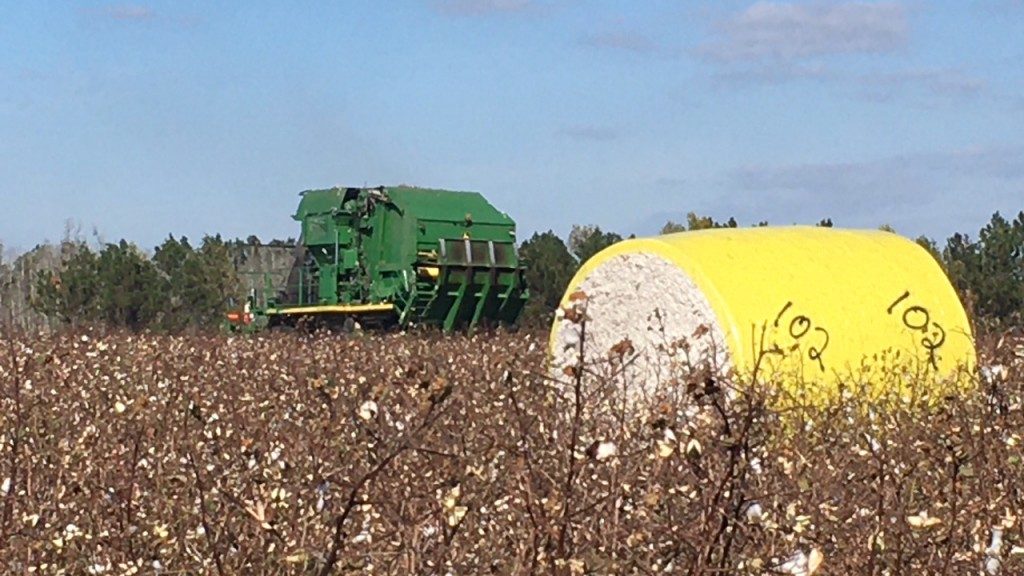Up Coming Meetings:
Colquitt County Cotton Production Meeting with be held on Monday, February 17, 2025 at the Colquitt County Extension office. This meeting will start at 12:00PM. Drs. Phillip Roberts, Camp Hand and Taylor Singleton will be our guest speakers.
The Colquitt County Forage Production Update will be held on Tuesday, February 25, 2025 at 7 PM. Dr. Lisa Baxter, UGA Forage Agronomist, will be the keynote speaker at this event. This meeting will take place at the Colquitt County Extension office.
If you are interested in attending these meetings please RSVP 229-616-7455, uge4071@uga.edu or online https://docs.google.com/…/1FAIpQLSeYt8uVfxSU6…/viewform
Pesticide and CCA credit will be offered.
The Georgia Conservation Tillage Alliance Annual Meeting will be held on February 18th and 19th in Tifton at ABAC’s Georgia Museum of Agriculture (Agrirama). See the flyer for registration and lodging information, and for the slate of speakers. For more information contact (229) 314-0196 or email: smcalli1@uga.edu.
Weather: The National Weather Service is predicting some low temperatures this week.

The US Drought Monitor has been updated again this week. Last week over 51% of Georgia was enduring D0-D4 conditions. The latest monitor shows that percentage rose to over 89%.
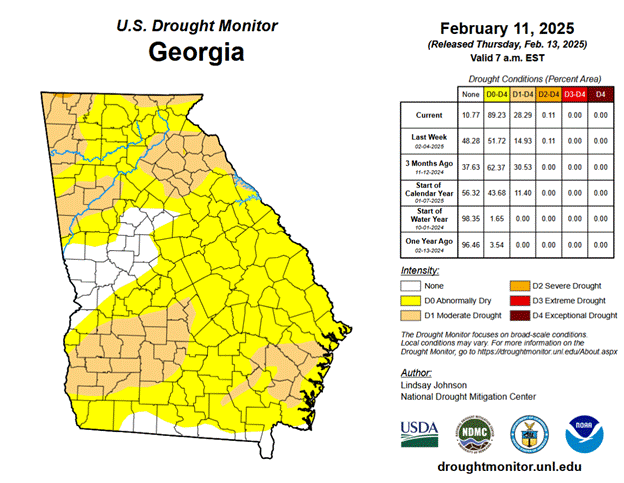
The graph below shows the 2 inch soil temperature for the period February 9-15, 2025. Two-inch soil temps range from above 65 degrees and drop to the upper 50’s to low 60’s toward the end of the week.
2-inch Soil Temperatures from February 9-15, 2025. Source: UGA Weather Station at the Expo

La Niña conditions present with a transition to ENSO-neutral likely during March-May 2025 (66% chance) by Pam Knox.
NOAA released the latest ENSO outlook today. It shows that La Nina is currently present as it has been for the last month, but it is weak and is expected to transition back to ENSO-neutral conditions by the March-May period. Neutral conditions are expected to continue through most of the summer, which may lead to another active Atlantic tropical season. Read More
It has been an unique February from a temperature stand point. Below shows the departure from normal temperature for the first half of February. Source: National Weather Service.
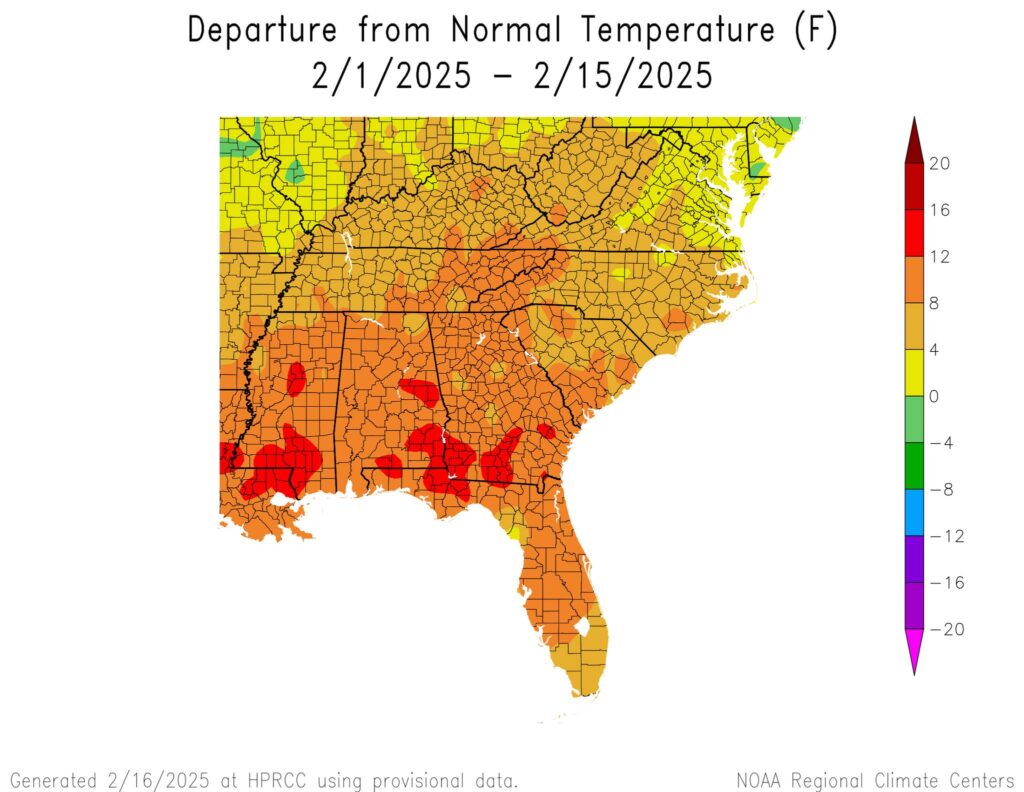
Beef and Forages:
UGA Beef Cattle Short Course!
Please join us on March 4th for the annual Tifton Beef Cattle Short Course in Irwinville, GA! We have a great day planned with educational talks and hands-on demonstrations. All of the information is below, or visit our website for additional information.
We will have vendors and representatives from several companies to visit with during the breaks and lunch. Participants this year will receive continuing education hours for Beef Quality Assurance (3 hours), private (1 hour) and commercial (1 hour) pesticide credits.
As always, this year’s short course will be held in conjunction with the 67th annual Tifton Bull Evaluation Sale. The sale will be held on the next day on March 5th, but the bulls will be available for viewing at the short course. Please visit our website for the sale catalog, videos of the bulls, and more information on the sale. If you have any questions about the program, please contact your local Extension office (1-800-ASK-UGA1).
Tifton Beef Cattle Short Course
Date: March 4th, 2025
Time: Check-in starts at 8:30
Program and registration: ugabeef.com/tifton
Rust! : We were at the winter annual forage demonstration at the high school late last week. Tanner Wilson found rust in the plot containing black oats. These demonstration plots were planted this past Halloween. The black oats fully tillered while the Horizon 720 plot was starting to joint.
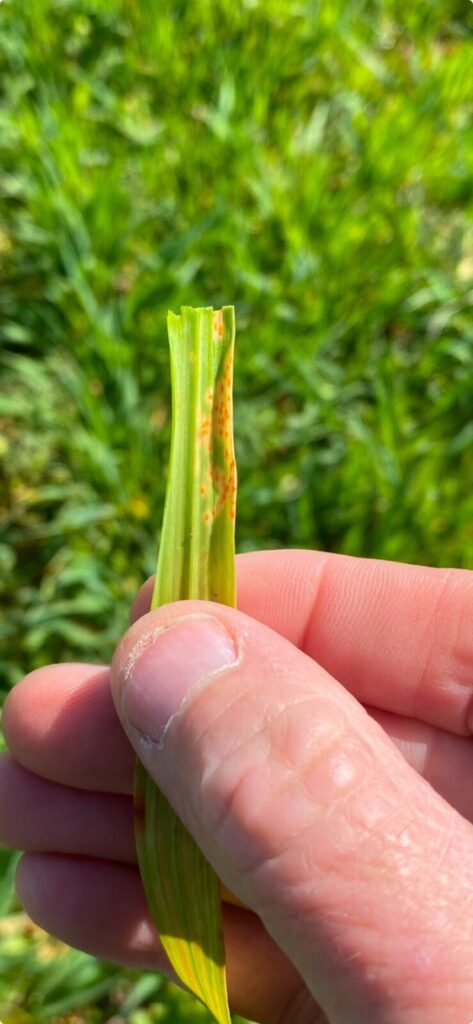
I have been getting a question or two about using residual herbicides in bermudagrass hay fields. Dr. Bob Stougaard, Professor, Department of Crop and Soil Sciences sent information about this to county agents late last week.
For bahiagrass and bermudagrass, apply Prowl H2O preemergence early in the spring before green-up at a broadcast rate of 1.1 to 4.2 qts/A. Do not apply to bahiagrass and bermudagrass after green-up in spring before first cutting. Prowl H2O may also be applied sequentially when the initial application is made in the dormant season and the subsequent application is made in-season between cuttings. Do not apply more than a maximum cumulative total of 4.2 qt/A per year.
Rezilon (Indaziflam) can be used for preemergence control of annual foxtails in established bermudagrass and bahiagrass. Rezilon can be applied at 3-5 fl oz per acre in a single preemergence application. Rezilon can also be applied preemergence early in the season at 3 fl oz/A followed by 3 fl oz/A mid- to late-season. Do not exceed 6 fl oz/A of Rezilon in a 12 month period with sequential applications.
Do not overseed cool season grasses (e.g. Italian ryegrass, wheat, etc.) for winter grazing for a period of at least 18 months after the last application of Rezilon. Similarly, do not
rotate to other crops for a period of 22 months after the last application of Rezilon. When Rezilon is applied at a rate greater than 3 fl oz/A, hay may not be harvested until 40 days after application. There are no grazing restrictions following the application of Rezilon.
Be sure to read and follow the label instructions for these products, and to contact your area Extension agent if you have any questions.

The latest install of the Beef Tips pod cast is available for your listening pleasure. Dr. Stewart discusses winter nutritional strategies for beef herds.
Corn: I have a twin row planter will it increase my corn yields? This is a question that comes up occasionally. According to the UGA Corn Production guide, most farm equipment in Georgia is set to plant in 36″ rows. Wider rows, 38 to 40″ rows usually result in little space between plants within a row. This creates in-row competition for water and nutrients. Studies conducted in corn reveal that yields increase as rows narrow at high plant populations (Table 3). This allows plants to exploit more moisture, nutrients and light due to greater space between plants. Narrow row spacing also helps weed control by shading the lower canopy. Row widths of 30 to 36 inches are adequate for top yields in Georgia. Twin-row configurations vary in Georgia from 7 inches to 12 inches between the twins on 36 to 30-inch centers. It is very important to achieve a complete hardpan disruption under each row. Most winged subsoil shanks will only fracture a 6 to 7-inch span and therefore will not completely cover the width of the twin row configuration. Para plowing or v-ripping will provide full root zone fracturing of the hard pan, but these methods can result in delayed field entry if high levels of rainfall occur.

Pecan: Dr. Wells and the UGA Pecan Team was in town last week to update growers what is new in pecan production. I thought this was an interesting slide about soil fertility. The table below shows how to make P, K, Zn and soil ph decisions based off soil test and leaf tissue analysis.
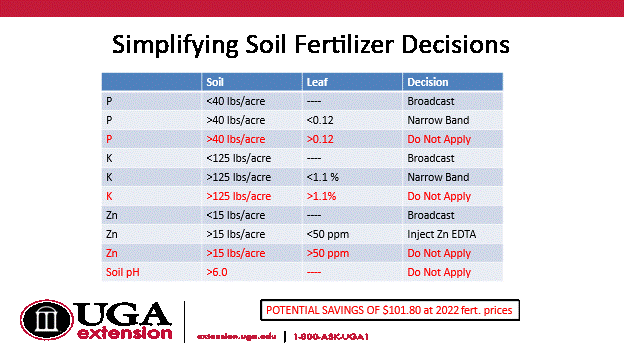
Paraquat Training: As required by EPA’s Paraquat Dichloride Human Health Mitigation Decision and amended paraquat dichloride labels, certified applicators must complete an EPA-approved training program before mixing, loading, and/or applying paraquat that is valid for 3 years after completion.
This includes (but is not limited to) any person transporting or storing opened pesticide containers, cleaning equipment, disposing of excess pesticides, spray mix, equipment wash waters, pesticide containers, and other materials containing paraquat.
The EPA-approved online training is available for free from Syngenta: Paraquat Training. Select a free virtual training date by clicking “Syngenta Crop Protection” on the linked EPA Paraquat Dichloride Training website.
If you are like me and do not know if I need the training again please go to this link.
Soybeans: For all the soybean growers out there is a free webinar series being offered by the Science for Success team of Soybean Extension Specialists. The series will feature leading researchers discussing solutions for two of the industry’s biggest challenges—weather variability and economic uncertainty. If you are interested in this series the registration link is here.
Have a great week,
Jeremy M. Kichler
Colquitt County Extension Coordinator
The University of Georgia Cooperative Extension does not endorse or guarantee the performance any products mentioned in this update.
